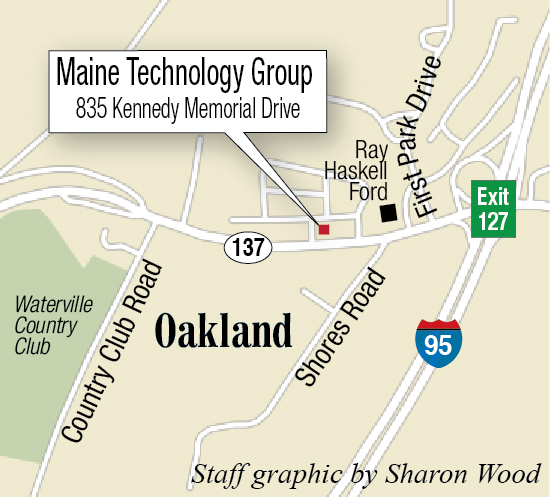OAKLAND — Cyberattacks and data breaches can be devastating to small and mid-sized companies: about 60% of organizations go out of business within six months of an attack, according to the U.S. National Cyber Security Alliance.
Belgrade resident Scott MacDonald, 45, said that’s part of what drives his work at the Maine Technology Group, which protects small- and mid-sized businesses from online threats — and helps them recover in the aftermath.
It’s not just businesses that are affected, though, MacDonald said. His company serves more than 80 clients throughout the state, several of which are municipalities and nonprofits. The issue hits close to home in central Maine, where the city of Augusta was recently the victim of a cyberattack that shut down the municipality’s network, including its public safety computers.
“With all of the different companies that you see in the news that suffer a breach, we wind up hearing from them 24, 48 hours after that,” MacDonald said. “So our challenge is how do we get out there prior to there being the breach, prior to the disaster.”
As more organizations look to take steps to protect themselves, the Maine Technology Group has been inundated with work.
The company expanded from its Winslow home base into a 6,000-square-foot satellite property on Kennedy Memorial Drive in Oakland earlier in June. The move brings with it four new jobs, MacDonald said, which raises its total workforce to 13 people, including Business Development Manager Sean Conerly. The Oakland space will house the sales and marketing wing of the business as well as MacDonald’s office.
“This is a growing industry; (it’s) not dying,” MacDonald said.
Maine Technology Group, founded in 2011, is one of a handful of data security and information technology service providers in the state. Others are concentrated mostly in the greater Portland area. MacDonald said the company pivoted from document management software sales to cybersecurity a year and a half ago in order to be at the forefront of the industry in Maine.
“It’s very refreshing to hear, as we get into these bigger companies, for them to say, ‘We didn’t realize there was a company like you here in Maine,'” MacDonald noted. “In fact, (Conerly) was just talking to someone last week, and they said they were looking at two other companies, both which were out of the state. It’s good to have it here. This is not just a viable option. We feel we are the best option, and we happen to be local.”
Garvan Donegan, senior economic development specialist for the Central Maine Growth Council, said that Maine Technology Group is an asset to not just the central Maine area but to the entire state.
“Within the context of technology being in every business, it is important that we have providers and managers of those systems, and right now with the risk of cyberattacks and how that can affect a business or a government or economy, having proper protections in place is absolutely key,” Donegan noted. “And then to think about the emerging technology and knowledge based hub within our region — to have young technologists living and working in the community has, frankly, a profound effect on creating a sense of place and keeping and retaining talent.”
According to research from IBM and the Ponemon Institute in 2018, the financial impacts of cyberattacks are increasing. The average cost of each record lost or stolen in a 2018 breach was $148, up 4.8% from 2017. MacDonald said that equated to an average cost of $150,000 for small businesses last year.
Clients pay about $35 per user per month for complete cyber coverage through Maine Technology Group, according to MacDonald, who called the fee “quite affordable compared to the alternatives.” Coverage involves technicians setting up “a virtual dome over the entity” and monitoring activity. Some of the top indicators technicians look for in order to secure a business are WiFi logins from unknown devices and any account information that is visible on the the dark web. The dark web is an encrypted network that cannot be accessed through search engines and is frequently associated with criminal activity.
“Everyone has something out there,” MacDonald said, though it can be difficult to conceptualize. If account information — such as a username and password — is exposed, it can have a ripple effect, as many people use the same login information for a variety of purposes, including banking and social media. Companies are required under Maine law to notify individuals within seven days if there is cause to believe their personal information has been acquired by an external party as the result of a cybersecurity breach.
“What happens when I’m an accountant and I have a thousand clients out there who I (do taxes for) and I have to send an email out that says, ‘We’ve been hacked. We don’t think they got anything, but we have to let you know.’?” MacDonald pointed out. “How many people are going to come back to you in April to get their taxes done? And that’s why (small businesses) can’t survive (after a breach). It’s very serious.”
MacDonald said he makes an effort to recruit students from the state’s technical centers and colleges. He noted that all but two technicians are graduates of Kennebec Valley Community College in Fairfield, which offers a degree in health information management. MacDonald is also the vice chair of the advisory board for Maine is IT!, a partnership between 16 colleges that aims to bridge the gap between the sharp decline of manufacturing jobs in the state and the increase in demand for skilled information technology workers.
Public outreach and education have been important components of Maine Technology Group’s work as well, according to MacDonald. In the fall, it will launch a seminar series called “Hack the Hacker,” geared toward small- and mid-sized businesses. These companies are among the most vulnerable, with a Verizon Breach Investigation Report published last month noting that 43% of all cyberattacks last year struck small businesses specifically. Most of these attacks go undetected for at least six months.
“Most people seem to think, ‘Well, I don’t lock my front door; why should I worry about locking down anything at the company?” said MacDonald. “But cyber (threats) are here. They’re here, and they are very active within the state.”
In addition to providing cybersecurity protection, Maine Technology Group also serves as a contracted IT service provider for businesses that do not have their own IT departments or for companies looking for additional IT support.
Send questions/comments to the editors.




Comments are no longer available on this story